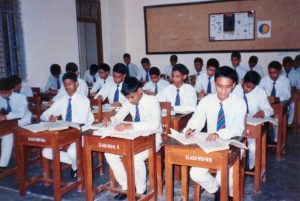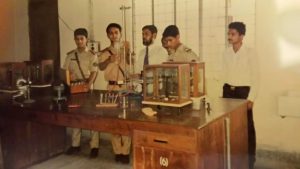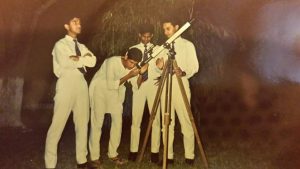Avoid Costly Mistakes With a Strong Mentoring Culture
একটি শক্তিশালী মেন্টরিং সংস্কৃতি আমাদের গুরুতর ভুলগুলোকে এড়াতে সাহায্য করতে পারে।

..today looking back, when I do an autopsy of my days of growing up, I feel I had no dearth of confidence, I just lacked wisdom and experience and I resisted asking anyone for guidance out of pride. It is also true, to some extent, that there was no accessible mentoring body in my surroundings.
Jane stopped by my office during my weekly office hour after receiving an F in the first midterm exam. The fact that she was very curious and inquisitive, I always thought that she was going to do well in the exam, although her questions on simple and obvious matters would surprise my presumptive impression of her. I, however, never openly expressed my exasperation toward her in spite of the fact that even students who would remain busy in the class toying with smartphones, or skip and cheat on assignments didn’t show such a sloppy performance in the first exam. It was the easiest of all the exams I offer in this course.
Rather than discussing any device electronics issue, she shared snippets of her life’s uncalled-for events that left a lasting impact on her life. She was an extraordinarily bright teen who skipped two grades by virtue of her merit. At sixteen, she received a scholarship from the University of California to join our engineering program. But Jane was neither sure nor happy about her choice. ‘I hardly made a good decision when I first came to the university. I never welcomed any guidance from anyone nor had the ability to navigate by myself’, she said. And then at seventeen Jane became a mother – a totally unexpected and unplanned turn of events in her life. Unable to find a balance between her studies and responsibility as a mother, she got dismissed from the university for failing to maintain the minimum GPA. Three years later, she is now back in school. Such a long break from school turned her into a drag in each course. ‘I was an overconfident and arrogant teenager and I thought I knew what I was doing. The truth is, I was a naive and inexperienced girl with a big ego’, Jane’s regretful inner voice kept reverberating this sentiment for a few minutes.
How can I help you with this course? I wanted to wrap up the discussion.
I am not going to give up on this course professor, she said. Please just don’t get upset if my questions are a little too silly. She made it obvious to me that some of her classmates suggested her to ask questions during office hours, rather than distracting the instructor during regular lectures.
I am paid to answer your questions, Jane, during the lecture as well during my office hours. I tried to maintain a positive tone. I lent her two of my reference books that offer a lot of solved problems and asked the teaching assistants to extend a little more help on anything she needed.
I want to graduate on time and find a job to support my son. Jane expressed her determination before leaving my office. She did not want to remain dependent on her parents who once had high hopes looking at her academic excellence and believed she was destined for great success. Her resolve was obvious.
 I looked back at my past and I asked myself – did I experience such turmoil as a teenager? Was I in a similar confusing state of mind that Jane had before she got dismissed from the university? Like many cadets, after the higher secondary certificate (HSC) exam, I received very little guidance from anyone other than my close family members. Many of my friends could effectively use a little more help from a mentor, a guide who knew more than what we knew, who could say what we needed to hear. In this short write-up, and possibly in more future pieces, I will attempt to illustrate my views on guidance and mentorship available to cadets immediately after the HSC exam. Every person’s story is unique and is knitted by fabrics of his own biases. I would not hesitate to acknowledge that, like many others, I made a large number of mistakes in my choices of life and career after the well-guided, regimented, and glorious cadet life at Rajshahi Cadet College, Bangladesh. Those missteps, which were obviously due to lack of proper guidance and mentoring, profoundly impacted my professional career as well as my personal life. I believe, young people possess great talents and even a pinch of waste of their talent is a tale of a tragedy that can be tackled if taken care of at the right moment.
I looked back at my past and I asked myself – did I experience such turmoil as a teenager? Was I in a similar confusing state of mind that Jane had before she got dismissed from the university? Like many cadets, after the higher secondary certificate (HSC) exam, I received very little guidance from anyone other than my close family members. Many of my friends could effectively use a little more help from a mentor, a guide who knew more than what we knew, who could say what we needed to hear. In this short write-up, and possibly in more future pieces, I will attempt to illustrate my views on guidance and mentorship available to cadets immediately after the HSC exam. Every person’s story is unique and is knitted by fabrics of his own biases. I would not hesitate to acknowledge that, like many others, I made a large number of mistakes in my choices of life and career after the well-guided, regimented, and glorious cadet life at Rajshahi Cadet College, Bangladesh. Those missteps, which were obviously due to lack of proper guidance and mentoring, profoundly impacted my professional career as well as my personal life. I believe, young people possess great talents and even a pinch of waste of their talent is a tale of a tragedy that can be tackled if taken care of at the right moment.
| I would not hesitate to acknowledge that, like many others, I made a large number of mistakes in my choices of life and career after the well-guided, regimented, and glorious cadet life at Rajshahi Cadet College, Bangladesh. Those missteps, that were obviously due to lack of proper guidance and mentoring, profoundly impacted my professional career as well as my personal life. |
Memories from my childhood …
My childhood before Cadet College was skirted by boundless blue skies of Dhaka and the endless excitement of running in vast empty fields and fishing and boating in lakes in the neighborhoods of Mirpur, where I grew up with the care and compassion of parents, teachers, and a host of relatives. When I was eleven years old, I joined ‘Gurugriha’, established by two of our beloved teachers, late Abdur Rahman and Salahuddin Sinha. Prior to my intake in RCC in 1981-82, I spent a summer shuttling between Mirpur and Dhanmondi preparing myself for the intake exam. I used every bit of soft-spoken encouragement and guidance of the Guru’s of Gurugriha to prepare myself to be part of a small group of seventh graders who joined RCC with me in 1982. That hot summer day of 6th June 1982 was a day of unfathomable encouragement and enthusiasm when my adolescent mind was so convinced that I had embarked on an epic adventure to become an educated and inspiring citizen. It was there where I spent the most important formative stages of my boyhood.
Rajshahi Cadet College: A perfect place for growing and glowing …
 At RCC, I was a boy with a quite compliant and submissive nature. I was lucky to be surrounded by the greatest students of our time in all grades. Many teachers, some were itinerant though, profoundly touched my heart. It may sound a little too ambitious at that age but I really believed that we had the responsibility to become the savior of the masses. We had to be perfect, the best and there was little room for any failure. Our batch had an envious set of cultural, sport, and intellectual heavyweights and I was deeply touched and inspired by my classmates. Among the smartest bunch of seven graders, I was an awkward, plain, occasional bookish boy mostly unnoticed by my batch mates and seniors. By the time I was in my tenth grade, I effectively employed all the available resources and ranked top in academic performance, secured the highest position in both SSC and HSC exams in the combined merit list in Bangladesh. With glory came confidence and I knew what I am capable of. I was appointed as the college prefect during 1987-88. I also started to leave marks on some extra-curricular activities and led our team in a TV debate. But, today looking back, when I do an autopsy of my days of growing up I feel I had no dearth of confidence, I just lacked wisdom and experience and I resisted asking anyone for guidance out of pride. It is also true, to some extent, that there was no accessible mentoring body in my surroundings.
At RCC, I was a boy with a quite compliant and submissive nature. I was lucky to be surrounded by the greatest students of our time in all grades. Many teachers, some were itinerant though, profoundly touched my heart. It may sound a little too ambitious at that age but I really believed that we had the responsibility to become the savior of the masses. We had to be perfect, the best and there was little room for any failure. Our batch had an envious set of cultural, sport, and intellectual heavyweights and I was deeply touched and inspired by my classmates. Among the smartest bunch of seven graders, I was an awkward, plain, occasional bookish boy mostly unnoticed by my batch mates and seniors. By the time I was in my tenth grade, I effectively employed all the available resources and ranked top in academic performance, secured the highest position in both SSC and HSC exams in the combined merit list in Bangladesh. With glory came confidence and I knew what I am capable of. I was appointed as the college prefect during 1987-88. I also started to leave marks on some extra-curricular activities and led our team in a TV debate. But, today looking back, when I do an autopsy of my days of growing up I feel I had no dearth of confidence, I just lacked wisdom and experience and I resisted asking anyone for guidance out of pride. It is also true, to some extent, that there was no accessible mentoring body in my surroundings.
Facing the reality of life …
Dhaka I left in 1982 was not a materialistic place yet. Money was not the only king, and anarchy and lawlessness were not prevalent to the extent we experience now. Although my generation was born around the time of the liberation war, we grew up with adults and country leaders who had an inchoate yearning for individual success. The brutal murder of two top leaders and a number of prominent politicians, the ruthless suppression of leftist movements, frequent bloody military coups, and disastrous extremism in university campuses left permanent scars in our lives. Gen. Ershad surely deserves the credit for leading the process to maturity. Young cadets, like myself, who spent all six years as cadets in a rather protective and pampered surroundings and witnessed twilight distress of controlled press, repression, favoritism, and growing moral numbness, had to face an unknown world of reality and operate independently in an egomaniac society where many educated and bright young people wanted to live intensely and wildly, and others wanted to emigrate.
| Young cadets, like myself, who spent all six years as cadets in a rather protective and pampered surroundings and witnessed twilight distress of controlled press, repression, favoritism, and growing moral numbness, had to face an unknown world of reality and operate independently in an egomaniac society, where many educated and bright young people wanted to live intensely and wildly, and others wanted to emigrate. |
Let’s prosper together …
In a self-centered Dhaka, Old Rajshahi Cadet’s Association’s (ORCA) slogan ‘Let’s Prosper Together’ sounded very appealing to me. I got involved with ORCA during the long Ershad vacation days after my HSC exam when political unrest was at its worst. I felt philanthropic joining the flood relief distribution initiative by ORCA when the extent of flooding was more than 82,000 sq. km in 1988. Enthusiastic volunteering in blood donation events, eye donation, and other charitable acts deeply moved my charitable souls like many others. My spirituality was pronounced in extending my hand towards the needy and the poor.
I, however, believe we didn’t receive much guidance from ORCA, from our teachers, from society, or from our friends and families. Some of us came from distant corners of the country to prepare for the university entrance exam, rented flats in Dhaka, or lived in noisy apartments shared with other non-ORCA people. Some of us were lucky to have relatives in Dhaka city. Many of us spent countless days hanging out aimlessly, not knowing how we could plan our future. A small minority even ran into delinquency through substance abuse. It was difficult to stay positive. Our youthful arrogance ignored the aged wisdom that was before us. Unemployed, toiling to collect ads for some ORCA publications, reading all the anti-Ershad writings, anti-military jokes, and spending time in a public library, USIS and British Council consumed our time and youth for years that were trickled in chaos, confusion, and uncertainty due to lack of mentoring and prudent guidance from whosoever we needed it from.
I would occasionally ask myself, is Cadet College a success story? For every well-attested, heavily researched, and authoritative argument made about cadets’ positive role and contribution to society, there are equally well-attested authoritative arguments opposing those. My three decades of affiliation and observations offered me a conviction that we were expected to run an expensive hundred-meter sprint race, while our whole society was watching us. Our starting blocks are at the Cadet Colleges and we successfully reach top speed covering sixty-meters through six years of intense programs. The remaining forty-meters remained incomplete or fragmentary unless we got strong guidance from our family, teachers, and alumni community. Unfortunately, many cadets are no different from my student Jane and their participation in the race doesn’t offer much excitement to the spectators – the countrymen. Some cadets can’t even run the last few meters and sadly drop out of the race.
There are many of Janes’ stories that were never told …
People ask me about the end of Jane’s story. Did she eventually graduate? Where is she now? I don’t share much of the details about her. It is probably the same old story – most talents are wasted. Jane’s school teachers thought she had an eclectic mind and a student of her caliber comes along rather rarely in their high school. She was destined for great success. Jane eventually managed to graduate from the University of California Davis with a bachelor’s degree in Electrical and Computer Engineering and went to work for a tech company in Silicon Valley as a design engineer. The harsh realities of her life didn’t keep any door open for admission to graduate school to pursue an advanced degree. There remained a great gap between parents’ and teachers’ aspirations, her goal in life, and reality.
I met Jane recently and she introduced me to C.H.A.M.P.S. mentoring program (Culturally Helping And Making Positive Success) that received blessings from President Obama. She enthusiastically mentioned Mudders Mentoring Mudders (M3) of Harvey Mudd College and Banter Mentorship and Networking Program of Olin College (Franklin Olin College of Engineering). Both are top colleges in the USA and Jane thinks ‘they do a great job guiding young people, they know how to make guidance palatable and how to be effective mentors’.
Subsequent to my departure from RCC, I needed mentors, trusted advisors who would tell me what I needed to hear, offer long-term guidance and accountability in the areas of my life that matter most. I know many cadets strongly feel a visceral sense of repugnance on hearing about the concept of guidance for eighteen or nineteen-year-old young adults. Some even express outrage against such concepts of ‘over-parenting’ and they would advocate experiments and learn from mistakes. I would accept that there are credible arguments on both sides of the view, but my student Jane would say some mistakes are too costly to make. We need to learn from other’s mistakes and that is what a mentorship culture offers.
A strong culture of mentorship and guidance …
We can perhaps have a discussion on establishing a strong tradition of mentorship for young people during their high school days. I believe this would be an area of a small investment with big returns. Many of us are very aware of our own strengths and weaknesses and demonstrated superb individual success. Though individual success is unquestionably important and can show the limit of human potentials, collective success is what builds a better society for all. Platforms that plant and nurture the seeds of a strong culture of mentorship and guidance are crucial for our lonely young adults during this age of digital obesity.
